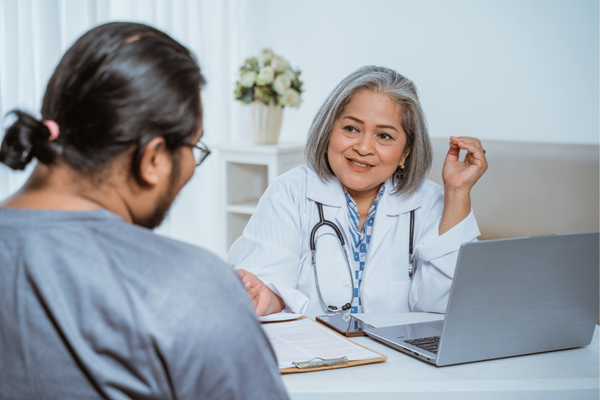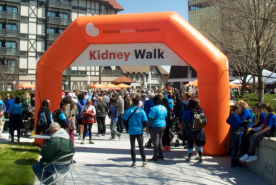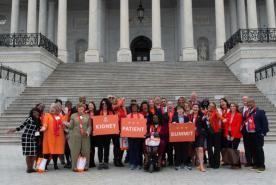February 23, 2023
Continuing education series for professionals.
Learn how to influence health literacy, find evaluation techniques, and implement multiple intervention strategies to help improve health literacy in your practice.
What is health literacy?
"Health literacy is the degree to which individuals have the capacity to obtain, process, and understand the basic health information needed to make appropriate health decisions," said Dr. Anju Yadav, transplant nephrologist. "It is much more than the ability to read pamphlets."
The Office of Disease Prevention and Health Promotion1 breaks health literacy into two definitions:
- Personal health literacy: Degree to which people can find, understand, and use information and services to inform health-related decisions.
- Organizational health literacy: Degree to which organizations equitably help people find, understand, and use information to help inform health-related decisions.
Tanisha Campbell, a transplant recipient diagnosed with kidney disease at age eight, experienced issues with health literacy twice throughout her kidney disease journey.
"We didn't have any coloring books to explain what the kidneys did or any age-appropriate information. I was glad to have family there that could break down all of the information for me," said Campbell. "When I was 22 and starting dialysis there wasn't much literature out there for young black women. All of my physicians talked over my head, but one nurse broke everything down to a level I understood. I credit her with the success I had going through dialysis and transplantation."
Learn more about the social determinants of health.
Resources to assess for health literacy

One of the most important ways healthcare professionals can reduce health inequalities is by recognizing and addressing patients with poor health literacy.
"Health literacy tools give us a baseline understanding of what a patient understands or what they know about the healthcare system but don't stop there. Health literacy is multifaceted and it's difficult to encompass everything in one tool or one assessment," said Dr. Katie McMurray, a clinical pharmacist.
Health literacy assessment tools:
- S-TOFHLA Questionnaire: Twelve-minute test of 36 reading comprehension items.
- Realm Short Form: Rapid estimate of adult health literacy using pronunciation abilities.
- The Newest Vital Sign: Assesses math, reading, and nutritional label reading skills.
Find more health literacy tools at the Agency for Healthcare Research and Quality.
"When interacting with patients, use simplified language and short sentences. Speak slowly and avoid technical terms entirely. Always try to ask the patients if they understand and have them repeat or demonstrate the instructions," said Dr. Yadav. "Use multi-modal visual and audiovisual modalities. It's essential to deliver education based on our patients' age, cultural background, ethnicity, and racial diversity."
The impact of limited health literacy
According to the National Assessment of Adult Literacy, 88% of Americans do not have proficient health literacy skills.2
"When I started doing diet recalls, I found that many didn't understand sodium. One patient was very adamant that he didn't eat anything with salt. Then he told me he had a hot dog for lunch and smothered pork chops for dinner," said registered kidney dietitian Karen Greathouse. "He had no clue there was sodium in these items. Many people think sodium is what we shake on the food, but they're unaware of it in processed foods."
Had Greathouse not spoken with this patient, he may have continued to consume excess sodium, quickly worsening his kidney function. He might have been labeled non-compliant if this behavior persisted, making it difficult or impossible to get a transplant referral.
"There is a whole group of people that may not be referred to transplant because they're labeled as non-adherent when they actually don't know what to do," said Dori Minch, a transplant social worker. "By impacting health literacy and providing targeted education in a way people can understand and absorb, we can increase transplant referrals and improve quality of life."
Keep learning: Read "Kidney Health For All: Bridging the Gap in Kidney Health Education and Literacy."
Resources to help increase health literacy
These resources may help your patients better understand kidney disease and make diet changes:
- Animated Kidney Numbers and CKD Heat Map Videos
- How to Read a Comprehensive Metabolic Panel
- How Much Sodium is Safe for Kidney Patients?
- Plant-Based Diets and Kidney Disease
- Following a Special Diet After a Kidney Transplant
Earn CE On the Go
Listen and earn CE as our panelists delve into the subjects that matter most to you while offering in-depth clinical updates and real-world examples of these changes. Subscribe to The Kidney Commute Podcast.
Works Cited
1Office of Disease Prevention and Health Promotion. (n.d.). Health Literacy in healthy people 2030. Health Literacy in Healthy People 2030. Retrieved February 6, 2023, from https://health.gov/healthypeople/priority-areas/health-literacy-healthy-people-2030
2Office of the Surgeon General. (2019, May 14). Health Literacy Reports and publications. HHS.gov. Retrieved February 6, 2023, from https://www.hhs.gov/surgeongeneral/reports-and-publications/health-literacy/index.html








